Key takeaways:
- Vegetarian diets exclude meat, poultry, and fish but include eggs and dairy, while veganism excludes all animal products.
- Vegan cooking enhances energy levels and provides a rich variety of nutrients and flavors, encouraging creative meal preparation.
- Vegetarian cooking is quick and accessible, often boosting mood and mental clarity through the use of fresh, whole ingredients.
- Key cooking techniques for both diets include roasting, sautéing, and using plant-based alternatives to enhance flavors and retain nutrients.
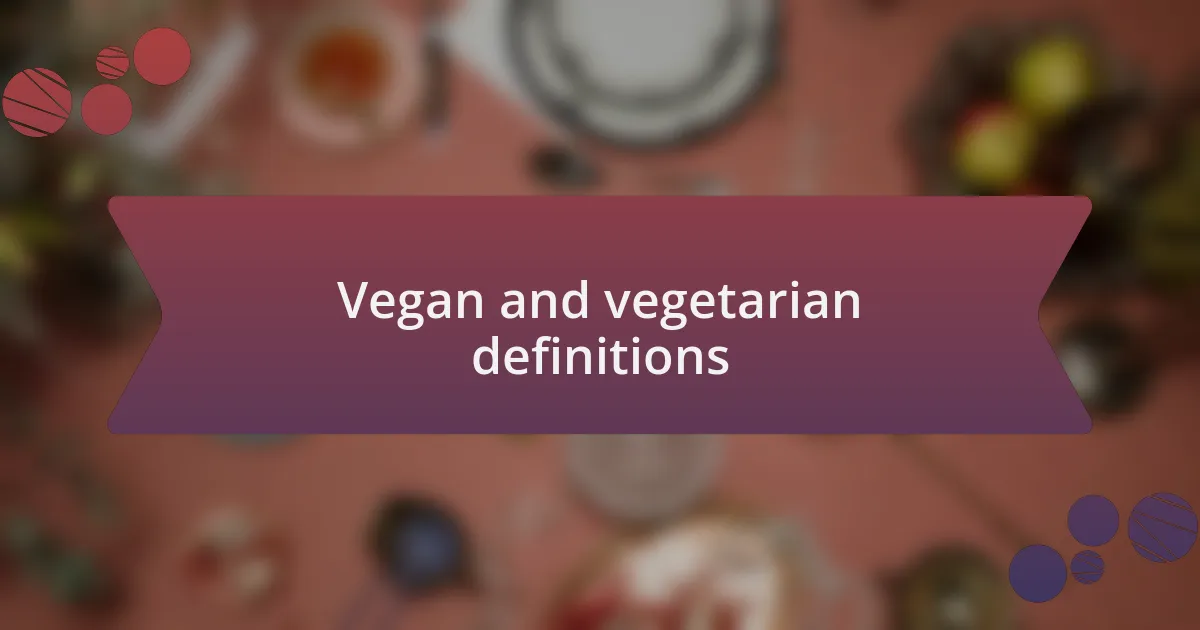
Vegan and vegetarian definitions
When I first delved into plant-based diets, I discovered that “vegetarian” refers to those who exclude meat, poultry, and fish from their meals but still enjoy eggs and dairy. It makes sense; this approach can be a wonderful way to boost vegetable intake while still enjoying some animal products. Have you ever tasted a fluffy vegetable omelet? It’s a delight that can easily resonate with those transitioning toward a more plant-focused lifestyle.
On the other hand, “vegan” means completely foregoing all animal products, which includes meat, eggs, dairy, and even honey. When I made the switch to veganism, I felt it had a profound impact on my cooking habits, challenging me to explore diverse ingredients and flavors I had never considered before. Have you ever thought about how many recipes can be transformed by simply omitting animal products? It opens a whole new world of creativity in the kitchen.
Understanding these definitions is crucial for anyone considering a transition. It’s not just about diet; it’s a lifestyle choice that reflects personal values regarding health, the environment, and animal welfare. I often ponder how this choice aligns with my own beliefs. What about you—how does your food philosophy shape your day-to-day meals?
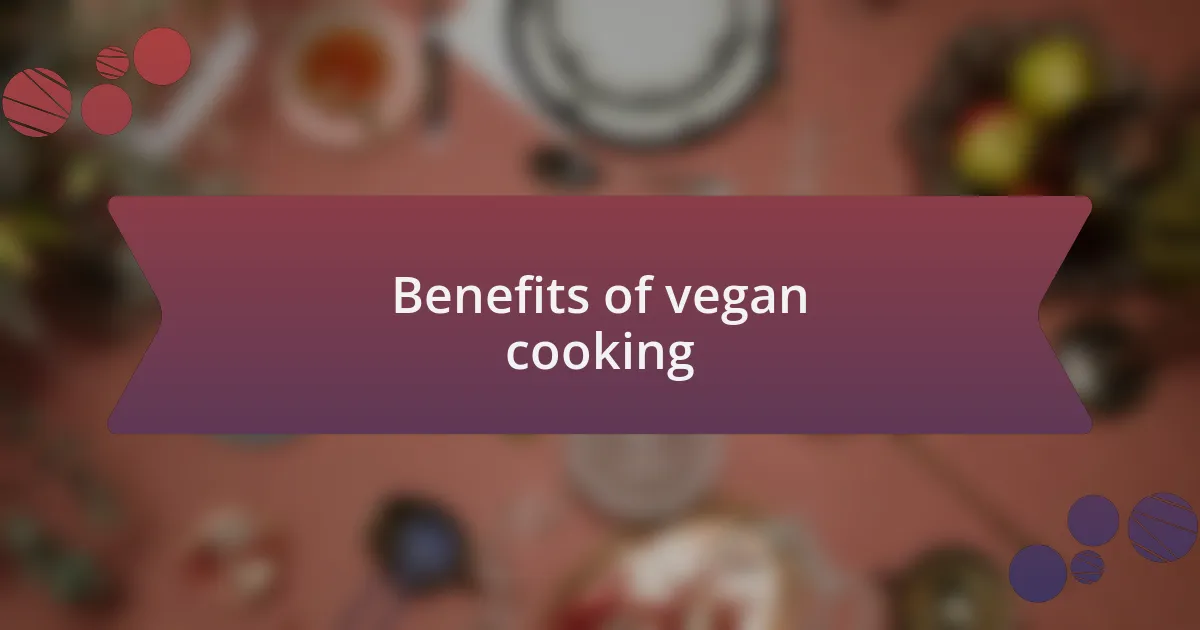
Benefits of vegan cooking
The benefits of vegan cooking extend far beyond simply avoiding animal products. When I embraced a vegan lifestyle, I discovered a richness in flavors and a variety of colors on my plate. Incorporating a broader range of fruits, vegetables, legumes, and grains not only enhanced my meals but also provided a palette of nutrients that I often overlooked when I consumed animal-based foods. Have you ever noticed how vibrant a bowl of quinoa, black beans, and roasted vegetables can look? It’s not just appealing to the eye; it’s a burst of health.
One surprising benefit I’ve experienced is the increase in my energy levels. Initially, I was skeptical—how could eating less (or no) animal protein lead to more energy? However, I found that plant-based foods provide a steady source of fuel without the heaviness that often accompanies meat. When I cook with ingredients like sweet potatoes, lentils, and leafy greens, I feel lighter and more alert throughout the day. Can you relate to the feeling of getting a “food coma” after a heavy meal? That’s something I genuinely don’t miss!
Moreover, vegan cooking often encourages innovative meal prep. I recall the first time I attempted a vegan version of my favorite curry—it was a delightful experiment with coconut milk, chickpeas, and a symphony of spices. The process opened my mind to new culinary techniques and helped me develop a more resourceful approach to cooking. How often do we limit ourselves to familiar recipes? By exploring veganism, I’ve realized there’s so much joy in trying something new, and it’s extended my repertoire in the kitchen significantly.
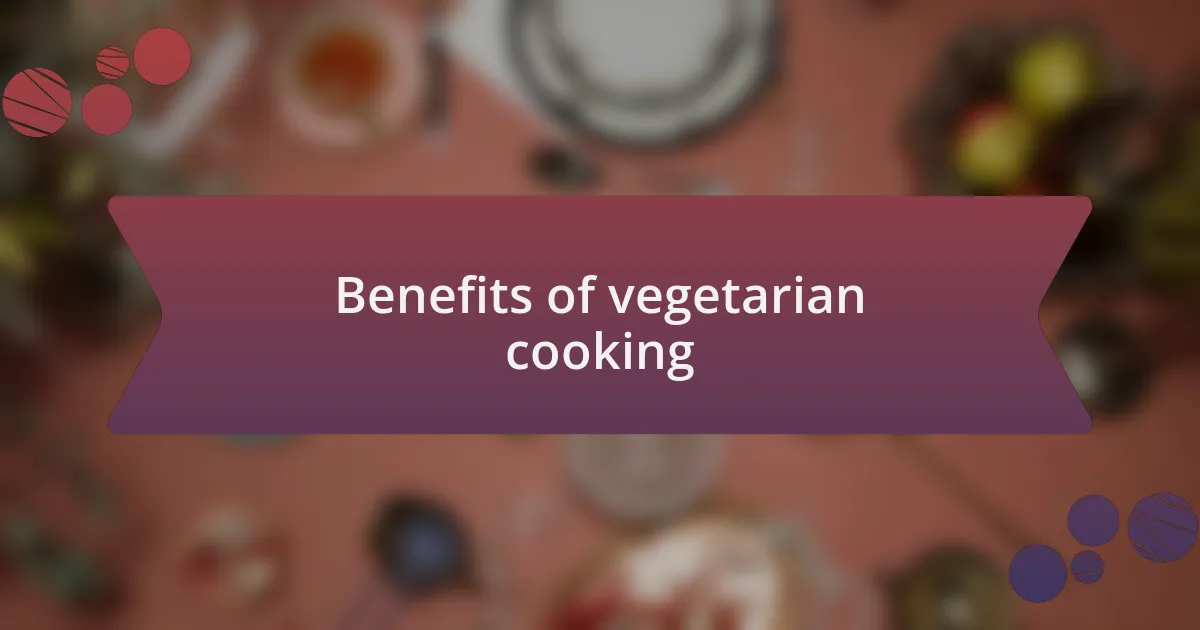
Benefits of vegetarian cooking
The beauty of vegetarian cooking lies in its simplicity and accessibility. I recall the first time I made a hearty vegetable stir-fry, filled with vibrant bell peppers, crunchy broccoli, and fragrant garlic. The best part? It was done in under 30 minutes! This speed makes vegetarian meals not just nutritious but also incredibly convenient for busy weekdays. Isn’t it wonderful to know you can whip up something delicious without spending hours in the kitchen?
Another significant benefit I’ve noticed is the positive impact on my mood and mental clarity. There’s something truly uplifting about cooking with fresh, whole ingredients. Whenever I sauté onions and herbs, I can feel the aroma lifting my spirits; it’s as if I’m enveloped in a warm hug from the kitchen. Have you ever felt a similar joy while preparing a meal? Eating these wholesome dishes often leaves me feeling lighter and happier, which I believe is the magic of vegetarian cooking.
Moreover, incorporating vegetarian recipes encourages mindful eating. I’ve found myself more connected to what’s on my plate when I include an array of colorful vegetables. The act of chopping, cooking, and savoring each bite makes me appreciate my food much more. Sometimes, I even find myself reflecting on how far I’ve come in my cooking journey. Have you ever taken a moment to truly enjoy a meal you created? That experience of gratitude can transform not just how we eat, but how we think about food altogether.
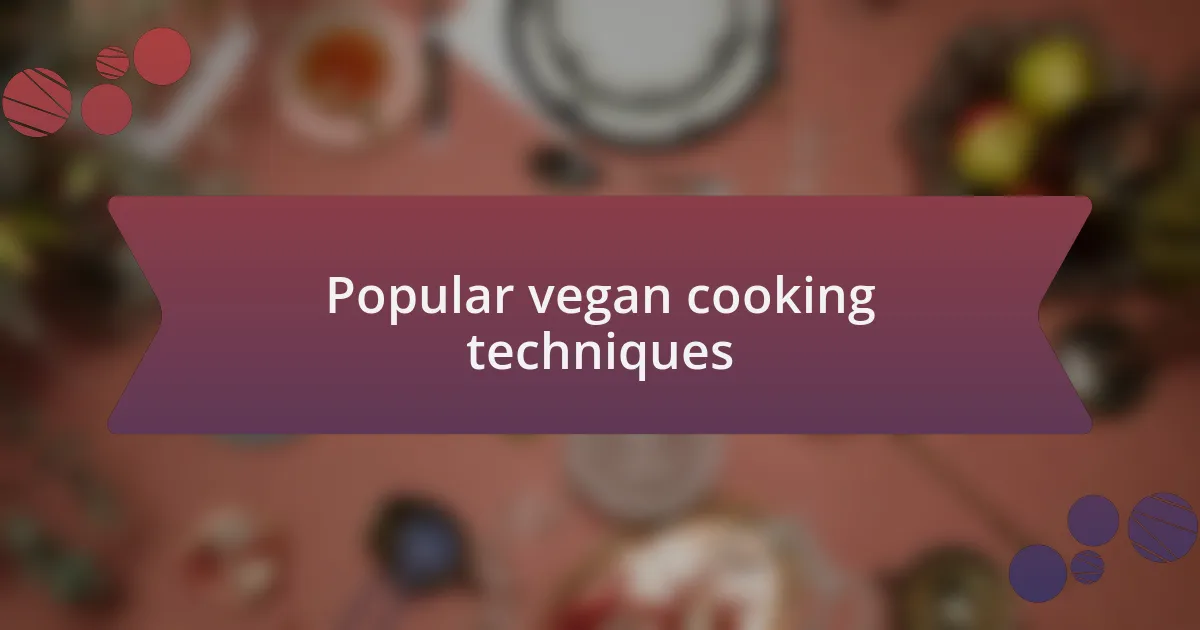
Popular vegan cooking techniques
When it comes to vegan cooking, one technique I frequently turn to is roasting. There’s something magical about tossing veggies like sweet potatoes and carrots with a bit of olive oil and spices, then letting them caramelize in the oven. The aroma fills my kitchen, and I find myself eagerly awaiting dinner as the vibrant colors transform. Have you tried roasting before? It truly enhances the natural sweetness of vegetables.
Another technique that I adore is using plant-based milks in my recipes. Blending cashews or oats into creamy milk alternatives opens endless possibilities for soups and sauces. I remember experimenting with a cashew cream using just soaked cashews, garlic, and a splash of lemon juice. The result was a velvety topping that elevated my pasta dish to something extraordinary. Have you thought about incorporating these nut milks into your cooking?
I also can’t stress enough the importance of proper seasoning in vegan dishes. Spices and herbs are the unsung heroes that can elevate a simple vegetable dish into a flavor explosion. I once made a chickpea curry that initially tasted bland. Then I added turmeric, cumin, and a hint of coconut milk, and it was like a symphony of flavors. Doesn’t it amaze you how a little seasoning can transform a boring meal into a culinary adventure?
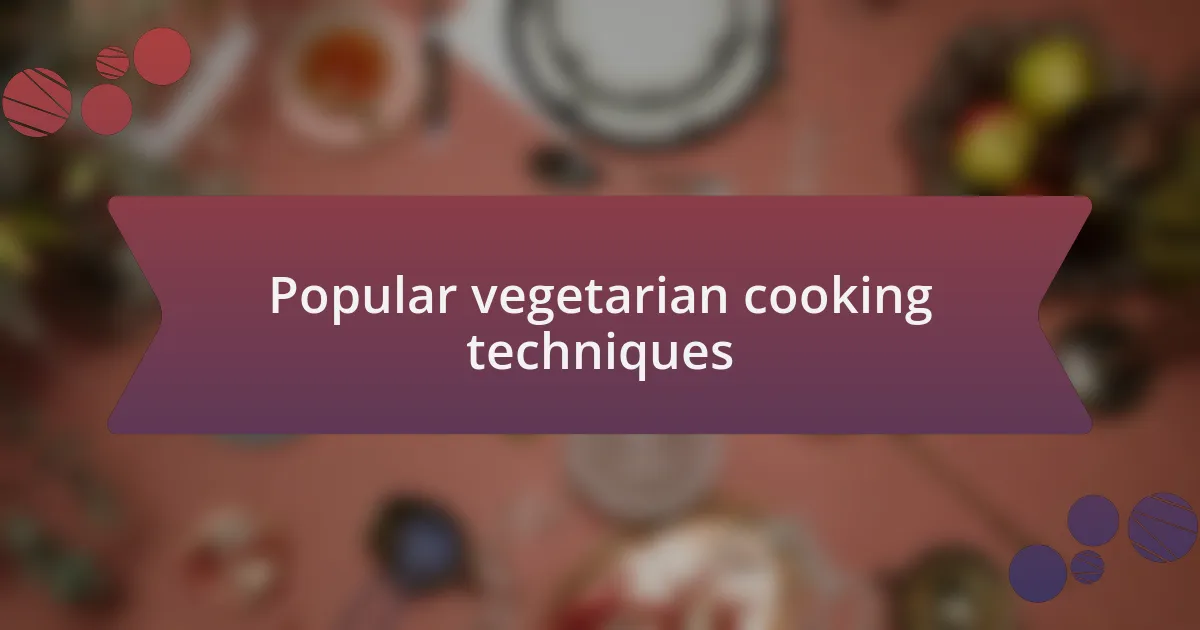
Popular vegetarian cooking techniques
One popular technique I often use is sautéing. It’s quick, it’s simple, and it allows for a wonderful interplay of flavors. Just the other day, I sautéed a mix of bell peppers, zucchini, and onions in a splash of olive oil. The vibrant colors sizzled in the pan, and the aroma of those caramelizing vegetables brought back memories of family dinners. Doesn’t it make you nostalgic thinking about the comforting meals from your own kitchen?
Another method I enjoy is steaming, especially when I want to retain the nutrients of my vegetables. It’s a gentle way to cook that keeps the bright colors and natural flavors intact. I remember steaming some broccoli and carrots for a weekend brunch, and the vibrant hues were so inviting. Pairing a squeeze of lemon and a sprinkle of salt afterward made a world of difference. Have you ever realized how steaming can be both healthy and delicious?
Lastly, I can’t overlook the technique of grilling. There’s just something special about the smoky flavor that grilling adds to vegetables. Once, I marinated eggplant and zucchini in a balsamic glaze and grilled them until they had those perfect char marks. The smokiness combined with the sweet marinade was pure bliss. Isn’t it fascinating how grilling vegetables can transform their flavor profile so dramatically?